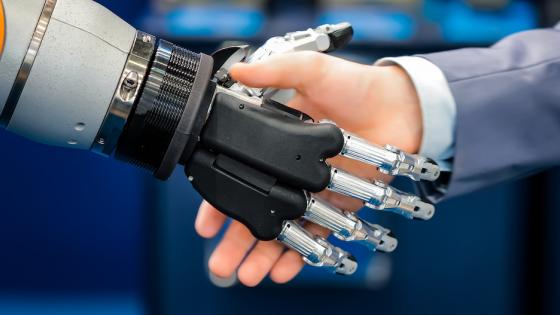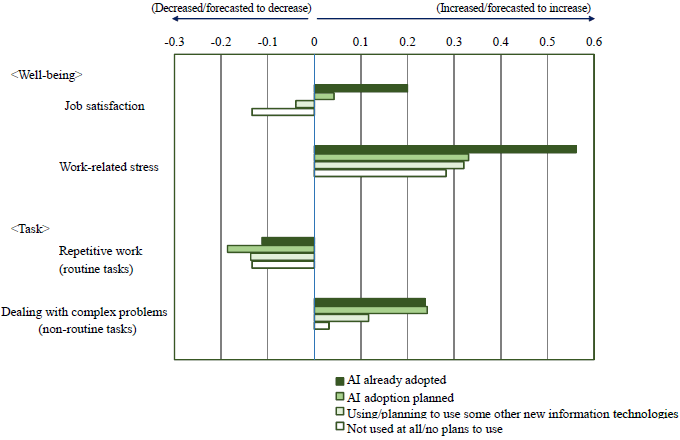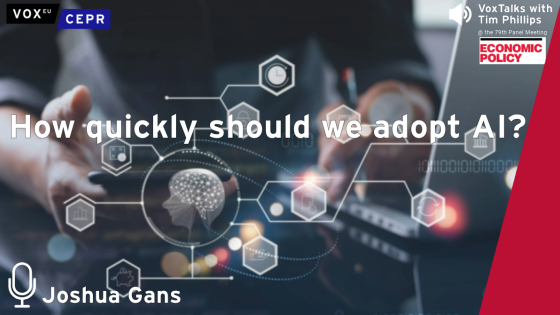The development and diffusion of new information technologies such as artificial intelligence (AI) continue apace (Bughin and Hazan 2017), but how are these factors likely to change work styles and worker well-being? More than a few observers take the view that AI will deprive workers of employment and constitutes a threat to them. However, new information technologies such as AI might affect not only employment and wages but also the way workers approach their work, and could influence aspects of their well-being, such as job satisfaction, stress, and health, in a variety of ways.
Relationship between technological innovation, employment, and wages
Ever since the Industrial Revolution, economists have raised the possibility of ‘technological unemployment’, in which employment is lost as a result of technological innovation. From the 1980s onward, findings of much research by labour economists have shown that the emergence of ‘skill-biased technological change’, the benefits of which accrue only to highly skilled workers, causes an increase in wage disparity. In recent years, there have been forecasts that new information technologies such as AI will deprive many workers of their jobs and that this will result in even more serious wage disparities.
The effects of technological innovation are not limited to employment, unemployment, and wages. They affect a wider range of issues, such as the nature of tasks in which workers are engaged, the workplace environment, job satisfaction, stress, and health. Since new information technologies can be applied to an extraordinarily broad range of tasks, there should be both positive and negative effects occurring in multiple directions.
Increased job satisfaction and stress caused by the diffusion of new information technologies
As a project of the Research Institute of Science and Technology for Society (RISTEX) of the Japan Science and Technology Agency, we implemented an original survey of approximately 10,000 workers and analysed the impact of new information technologies on approaches to work and on well-being. One interesting finding is that, as shown in Figure 1, the more new information technologies such as AI is adopted, the larger the increase in worker job satisfaction. Conversely, there is a tendency for work-related stress to also increase.
Figure 1 Changes in well-being and tasks as a result of the introduction of new information technologies (subjective impact)
Note: These are the collated responses to the question of how much change has occurred (or how much change is forecasted to occur) in tasks and well-being as a result of the introduction of new information technologies.
Source: JST-RISTEX Planned Survey Report for Fiscal 2017 (Principal Investigator: Isamu Yamamoto)
Increasing task complexity
This finding is likely related to the new information technologies’ effect on the nature of tasks in which workers are engaged. As shown in Figure 1, the more that information technologies have been adopted, the greater the shift in the nature of tasks performed by the worker from highly repetitive routine tasks to non-routine tasks that require complex problem-solving. This suggests that when AI technologies are adopted, there is a tendency for workers to move away from tasks that can be accomplished by AI and instead use the time freed up to concentrate on more complex tasks that can only be performed by humans.
We interpret this as meaning that many of those workers who have experienced the introduction of new information technologies feel work-related stress as a consequence of increasing task complexity. At the same time, the more complex the work, the greater is the sense of satisfaction when it is accomplished, resulting in a rising trend for job satisfaction.
The influence of AI technologies on well-being and approaches to work is complex. It is thus necessary to further analyse the changes brought about by the emergence and subsequent diffusion of technological innovation.
Job demands-resources model
As shown above, the spread of new information technologies may have positive effects such as an increase in job satisfaction, but it may also cause negative outcomes such as an increase in stress. Arguably, it is necessary to find ways of dealing with this issue.
In such situations, the ‘job demands-resources model’ developed in occupational health studies provides a useful insight. According to this model, the stress on the worker rises as demands of the job increase, whereas stress decreases when more resources are made available to support the worker in handling the demands of the job.
‘Job demands’ can include both the number and difficulty of tasks. Within the context of our study, the introduction of new information technologies leads to an increase in task difficulty and a need for the worker to acquire new skills and knowledge to cope with the new tasks. In other words, the increase in stress shown above can be interpreted as an increase in job demands caused by the introduction of new information technologies.
On the other hand, ‘job resources’ encompasses a range of factors, such as the support and leadership of line managers, assistance from and trust relationships with co-workers, and efforts made by human resource management. A variety of measures and methods to reinforce those resources is theorised to exist at the firm, workplace, individual, and other levels (Shaufeli et al. 2009, Shimazu and Shaufeli 2009).
‘Job resources’ mitigate increases in stress
We have reviewed the nature of the influence of ‘job resources’ on worker stress and mental health at the Research Institute of Economy, Trade and Industry (RIETI). For example, in Kuroda and Yamamoto (2018a, 2018b, 2016) and Sato (2015), the panel data made it clear that factors such as unambiguous work goals, the amount of individual discretion allowed, a low level of unscheduled work, a workplace culture that did not by default expect long working hours, the volume of communication between line managers and their subordinates, and the ability level of line managers all led to improvements in the state of worker mental health, even after controlling for wages, continuous years of service, and other individual attributes. It is precisely these factors that can be considered ‘job resources’.
Since new information technologies such as AI generate a positive influence on the approach to work and individual well-being, it would seem reasonable to facilitate the maximum possible enjoyment of such benefits. However, negative side effects such as increases in work-related stress and deterioration in health may also occur. Extracting the maximum benefit from the positive aspects of new information technologies requires that job resources be strengthened and side effects be minimised.
References
Bughin, J and E Hazan (2017), “The new spring of artificial intelligence: A few early economies”, VoxEU.org, 21 August.
Kuroda, S, and I Yamamoto (2016), “Workers’ mental health, long work hours, and workplace management: Evidence from workers’ longitudinal data in Japan”, RIETI Discussion Paper Series 16-E-017.
Kuroda, S, and I Yamamoto (2018a), “Why do people overwork at the risk of impairing mental health?”, Journal of Happiness Studies.
Kuroda, S, and I Yamamoto (2018b), “Good boss, bad boss, workers’ mental health and productivity: Evidence from Japan”, Japan and the World Economy 48: 106-118.
Sato, K (2015), “The impact on mental health of promotion to management”, RIETI Discussion Paper Series 15-J-062.
Schaufeli, W, A Bakker and W van Rhenen (2009), “How changes in job demands and resources predict burnout, work engagement, and sickness absenteeism”, Journal of Organizational Behavior 30(7): 893-917.
Shimazu, A, and W Schaufeli (2009), “Is workaholism good or bad for employee well-being? the distinctiveness of workaholism and work engagement among Japanese employees”, Industrial Health 47(5): 495-502.





